英语过去将来时专项
高考英语过去将来时题20套(带答案)
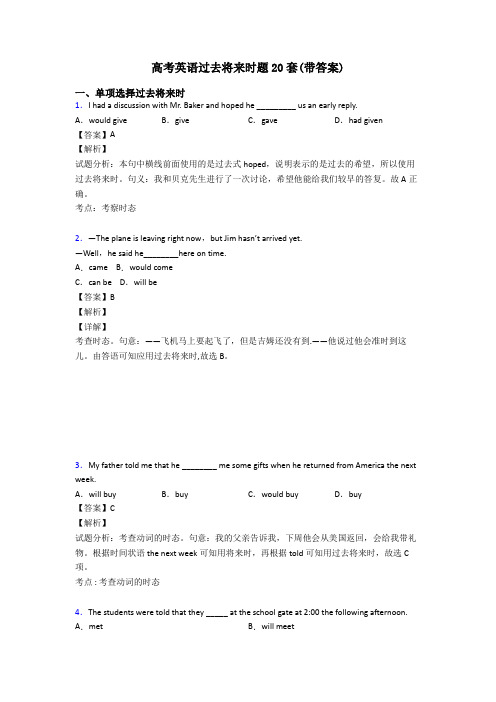
试题分析:考查动词时态。根据looked forward to seeing her husband.可知汽车还没有到达,因此用过去将来时态,句意:她匆忙跑到汽车将会到达的入口处,盼望着能看到她的丈夫。
考点:考查动词时态。
13.-- Come on. I have a gift for you.
A.metB.will meet
C.were to meetD.were met
【答案】C
【解析】
试题分析:考查时态的语境运用。本题意为:学生们被告知将在第二天下午两点在学校大门集合。从told可以看出这是发生在过去的将来时,排除B选项和A选项,be to do表示将要发生的事情,符合题意。本题意为:学生们被告知将在第二天下午两点在学校大门集合。故选C项。
【答案】C
【解析】
考查时态。宾语从句的主句谓语动词是过去式,从句应用过去的某种时态,故B、D排除;又因为汽车被偷,应发生在said之前,故应用过去完成时。
6.John was given the same suitcase his father and grandfather _______with them to school.
高考英语过去将来时题20套(带答案)
一、单项选择过去将来时
1.I had a discussion with Mr. Baker and hoped he _________ us an early reply.
A.would giveB.giveC.gaveD.had given
【答案】A
【解析】
考点:考查时态的语境运用。
5.He said that his car________stolen and he________have to telephone the police.
【英语】高三英语过去将来时专项训练100(附答案)及解析

【英语】高三英语过去将来时专项训练100(附答案)及解析一、单项选择过去将来时1.We made ____ clear when and where we ____ going to have the meeting.A.that; are B.it; are C.it; were D.that; were【答案】C【解析】试题分析:句意:我们弄清楚了什么时间和什么地点召开会议。
这里it是形式宾语,真正的宾语是后面的从句;第二空谓语动词的时态根据主句的动词来确定,主句用了过去式,宾语从句也用过去式,故选C。
考点:考查代词及动词时态的用法。
点评:本题难度适中。
代词是高中阶段要求掌握的语法项目,尤其是it的用法多,并且还是高考常考的知识点,需要考生在平时反复的练习中巩固掌握它的用法。
动词的时态是高考必考的内容,考生必须会理解不同时态的用法。
即学即练:At the shop, they wanted to show me all the dresses, but I was interested only in________ in the window.A. thisB. thatC. itD. the one解析:D。
the one替代the dress.2.—Have you been to Mexico?—No, I ______ last year, but Dad wouldn’t let me.A.was to have gone B.was to goC.was gone D.went【答案】A【解析】【详解】试题分析:考查时态。
句意:——你去过墨西哥吗?——没有,去年我打算去的,但爸爸不让我去。
be + to do通常表示“计划、安排”将要做的事情,还表示“有义务”要做的事。
但在此,was to have done表示“过去原打算要做而没有做的事”。
故选A。
3.Nowhere else, as Tim said, _____ except to the small garden in the backyard after school. A.he has gone B.he did goC.had he gone D.would he go【答案】D【解析】试题分析考查倒装。
过去将来时专项练习(附答案)
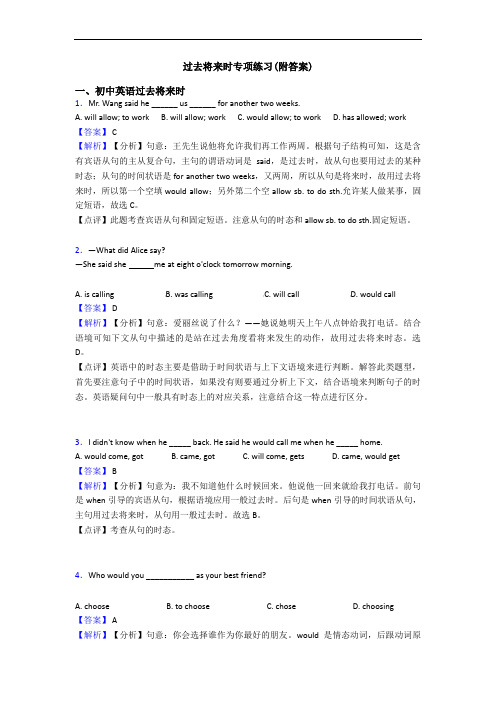
过去将来时专项练习(附答案)一、初中英语过去将来时1.Mr. Wang said he ______ us ______ for another two weeks.A. will allow; to workB. will allow; workC. would allow; to workD. has allowed; work 【答案】 C【解析】【分析】句意:王先生说他将允许我们再工作两周。
根据句子结构可知,这是含有宾语从句的主从复合句,主句的谓语动词是said,是过去时,故从句也要用过去的某种时态;从句的时间状语是for another two weeks,又两周,所以从句是将来时,故用过去将来时,所以第一个空填would allow;另外第二个空allow sb. to do sth.允许某人做某事,固定短语,故选C。
【点评】此题考查宾语从句和固定短语。
注意从句的时态和allow sb. to do sth.固定短语。
2.—What did Alice say?—She said she me at eight o'clock tomorrow morning.A. is callingB. was callingC. will callD. would call【答案】 D【解析】【分析】句意:爱丽丝说了什么?——她说她明天上午八点钟给我打电话。
结合语境可知下文从句中描述的是站在过去角度看将来发生的动作,故用过去将来时态。
选D。
【点评】英语中的时态主要是借助于时间状语与上下文语境来进行判断。
解答此类题型,首先要注意句子中的时间状语,如果没有则要通过分析上下文,结合语境来判断句子的时态。
英语疑问句中一般具有时态上的对应关系,注意结合这一特点进行区分。
3.I didn't know when he _____ back. He said he would call me when he _____ home.A. would come, gotB. came, gotC. will come, getsD. came, would get【答案】 B【解析】【分析】句意为:我不知道他什么时候回来。
英语过去将来时专题练习(及答案)含解析
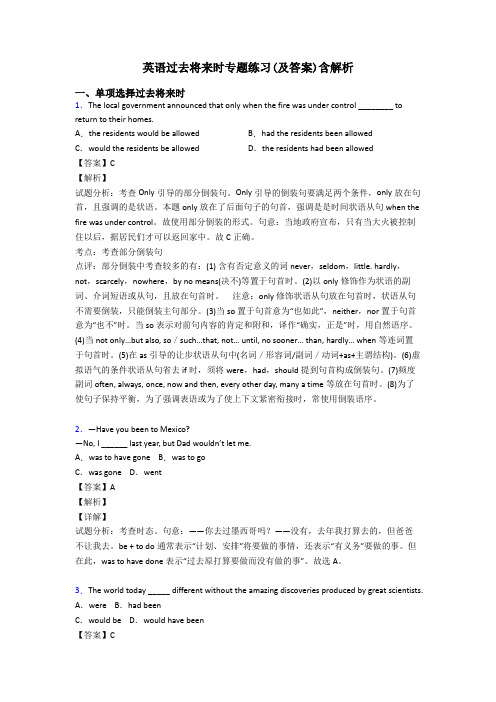
A.would giveB.giveC.gaveD.had given
【答案】A
【解析】
试题分析:本句中横线前面使用的是过去式hoped,说明表示的是过去的希望,所以使用过去将来时。句义:我和贝克先生进行了一次讨论,希望他能给我们较早的答复。故A正确。
14.He said that his bike _____ stolen and he _____ telephone the police.
A.was; would have toB.has; will have to
C.has been; will have got toD.had been; would have to
【答案】C
【解析】
考查时态。宾语从句的主句谓语动词是过去式,从句应用过去的某种时态,故B、D排除;又因为汽车被偷,应发生在said之前,故应用过去完成时。
6.When Harry was at college, he ________ go to the reading room after supper every day.
A.will goB.would goC.have goneD.had gone
【答案】B
【解析】
试题分析:考查宾语从句的时态:主句的时态是过去时said,宾语从句的时态用相应的过去时,时间是the next week,用过去将来时。
考点:考查宾语从句的时态
点评:宾语从句的时态和一般和主句一致,当主句是一般现在时时,宾语从句的时态按具体情况做,但如果主句的时态是过去时的时候,宾语从句的时态用相应的过去时,但是要注意特殊情况,这题就是。
【英语】英语过去将来时题20套(带答案)及解析
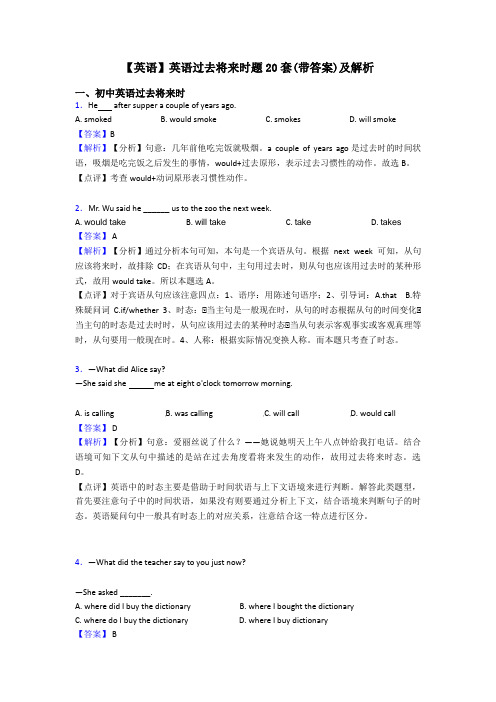
【英语】英语过去将来时题20套(带答案)及解析一、初中英语过去将来时1.He after supper a couple of years ago.A. smokedB. would smokeC. smokesD. will smoke【答案】B【解析】【分析】句意:几年前他吃完饭就吸烟。
a couple of years ago是过去时的时间状语,吸烟是吃完饭之后发生的事情,would+过去原形,表示过去习惯性的动作。
故选B。
【点评】考查would+动词原形表习惯性动作。
2.Mr. Wu said he ______ us to the zoo the next week.A. would takeB. will takeC. takeD. takes【答案】 A【解析】【分析】通过分析本句可知,本句是一个宾语从句。
根据next week可知,从句应该将来时,故排除CD;在宾语从句中,主句用过去时,则从句也应该用过去时的某种形式,故用would take。
所以本题选A。
【点评】对于宾语从句应该注意四点:1、语序:用陈述句语序;2、引导词:A.that B.特殊疑问词C.if/whether 3、时态:•当主句是一般现在时,从句的时态根据从句的时间变化‚当主句的时态是过去时时,从句应该用过去的某种时态ƒ当从句表示客观事实或客观真理等时,从句要用一般现在时。
4、人称:根据实际情况变换人称。
而本题只考查了时态。
3.—What did Alice say?—She said she me at eight o'clock tomorrow morning.A. is callingB. was callingC. will callD. would call【答案】 D【解析】【分析】句意:爱丽丝说了什么?——她说她明天上午八点钟给我打电话。
结合语境可知下文从句中描述的是站在过去角度看将来发生的动作,故用过去将来时态。
英语过去将来时专项及解析
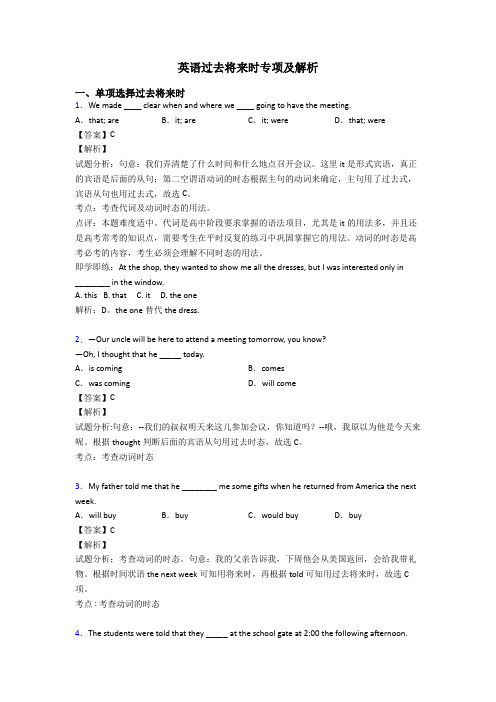
英语过去将来时专项及解析一、单项选择过去将来时1.We made ____ clear when and where we ____ going to have the meeting.A.that; are B.it; are C.it; were D.that; were【答案】C【解析】试题分析:句意:我们弄清楚了什么时间和什么地点召开会议。
这里it是形式宾语,真正的宾语是后面的从句;第二空谓语动词的时态根据主句的动词来确定,主句用了过去式,宾语从句也用过去式,故选C。
考点:考查代词及动词时态的用法。
点评:本题难度适中。
代词是高中阶段要求掌握的语法项目,尤其是it的用法多,并且还是高考常考的知识点,需要考生在平时反复的练习中巩固掌握它的用法。
动词的时态是高考必考的内容,考生必须会理解不同时态的用法。
即学即练:At the shop, they wanted to show me all the dresses, but I was interested only in________ in the window.A. thisB. thatC. itD. the one解析:D。
the one替代the dress.2.—Our uncle will be here to attend a meeting tomorrow, you know?—Oh, I thought that he _____ today.A.is coming B.comesC.was coming D.will come【答案】C【解析】试题分析:句意:--我们的叔叔明天来这儿参加会议,你知道吗?--哦,我原以为他是今天来呢。
根据thought判断后面的宾语从句用过去时态,故选C。
考点:考查动词时态3.My father told me that he ________ me some gifts when he returned from America the next week.A.will buy B.buy C.would buy D.buy【答案】C【解析】试题分析:考查动词的时态。
英语过去将来时专项及解析
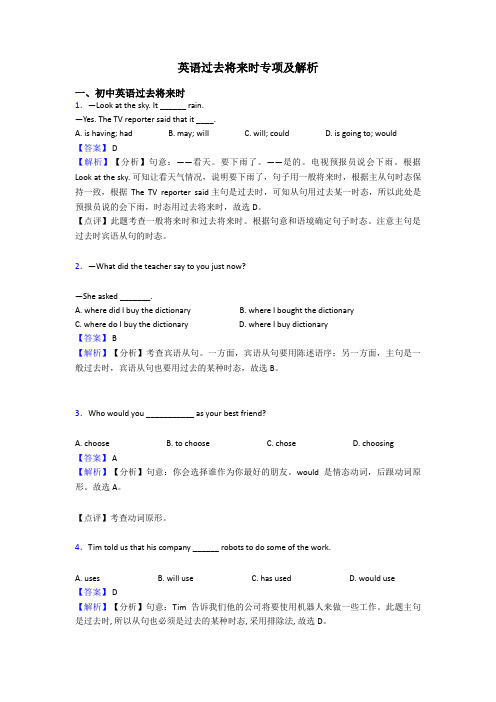
英语过去将来时专项及解析一、初中英语过去将来时1.—Look at the sky. It ______ rain.—Yes. The TV reporter said that it ____.A. is having; hadB. may; willC. will; couldD. is going to; would【答案】 D【解析】【分析】句意:——看天。
要下雨了。
——是的。
电视预报员说会下雨。
根据Look at the sky. 可知让看天气情况,说明要下雨了,句子用一般将来时,根据主从句时态保持一致,根据The TV reporter said主句是过去时,可知从句用过去某一时态,所以此处是预报员说的会下雨,时态用过去将来时,故选D。
【点评】此题考查一般将来时和过去将来时。
根据句意和语境确定句子时态。
注意主句是过去时宾语从句的时态。
2.—What did the teacher say to you just now?—She asked _______.A. where did I buy the dictionaryB. where I bought the dictionaryC. where do I buy the dictionaryD. where I buy dictionary【答案】 B【解析】【分析】考查宾语从句。
一方面,宾语从句要用陈述语序;另一方面,主句是一般过去时,宾语从句也要用过去的某种时态,故选B。
3.Who would you ___________ as your best friend?A. chooseB. to chooseC. choseD. choosing【答案】 A【解析】【分析】句意:你会选择谁作为你最好的朋友。
would是情态动词,后跟动词原形。
故选A。
【点评】考查动词原形。
4.Tim told us that his company ______ robots to do some of the work.A. usesB. will useC. has usedD. would use【答案】 D【解析】【分析】句意:Tim 告诉我们他的公司将要使用机器人来做一些工作。
专项训练 过去将来时练习题(含答案)含答案解析

专项训练过去将来时练习题(含答案)含答案解析一、初中英语过去将来时1.When I was a student,I my homework every night.A. doB. will doC. didD. would do【答案】D【解析】【分析】句意:当我还是个学生的时候,我每天晚上做作业。
When引导时间状语从句,从句用一般过去时,主句用过去将来时,would+动词原形,表示过去习惯性的动作。
故选D。
【点评】考查would+动词原形表习惯性动作。
2.Mr. Wu said he ______ us to the zoo the next week.A. would takeB. will takeC. takeD. takes【答案】 A【解析】【分析】通过分析本句可知,本句是一个宾语从句。
根据next week可知,从句应该将来时,故排除CD;在宾语从句中,主句用过去时,则从句也应该用过去时的某种形式,故用would take。
所以本题选A。
【点评】对于宾语从句应该注意四点:1、语序:用陈述句语序;2、引导词:A.that B.特殊疑问词 C.if/whether 3、时态:•当主句是一般现在时,从句的时态根据从句的时间变化 当主句的时态是过去时时,从句应该用过去的某种时态ƒ当从句表示客观事实或客观真理等时,从句要用一般现在时。
4、人称:根据实际情况变换人称。
而本题只考查了时态。
3.—Would you like to go boating with me?—Sure.________A. I'd likeB. I'd loveC. I'll be gladD. I'd love to【答案】 D【解析】【分析】—你想与我一起去划船吗?—当然,我乐意去。
I'd like后缺少了to;I'd love后面同样缺少to;I'll be glad 后缺少to;原句中would like to do sth.是愿意去做某事,回答的时候用I'd love/like to。
【英语】 英语过去将来时专题练习(及答案)及解析

【英语】英语过去将来时专题练习(及答案)及解析一、单项选择过去将来时1.Tom took out a piece of paper he and started reading in a clear tone.A.was preparing B.would prepare C.have prepared D.had prepared【答案】B【解析】试题分析:考查时态,准备这个动作在过去的时间里还没有发生,and连接两个并列结构,句子意思“汤姆拿出一张他将准备的纸用清晰的嗓音开始读”,所以选B考点:考查时态点评:时态是常考内容。
做时态题时,首先看时间状语,由时间状语来确定句子的时态;如果没有时间状语,就从句子暗含的意思来确定句子的时态2.—The plane is leaving right now,but Jim hasn’t arrived yet.—Well,he said he________here on time.A.came B.would comeC.can be D.will be【答案】B【解析】【详解】考查时态。
句意:——飞机马上要起飞了,但是吉姆还没有到.——他说过他会准时到这儿。
由答语可知应用过去将来时,故选B。
3.----Why didn’t you apply for the job?----I ________, but my old friend offered me a better one.A.was going to B.would C.will D.am going to【答案】A【解析】试题分析:考查情景交际和时态。
句意:--你为什么没有申请那份工作?--我本打算(申请),但是我的老朋友给我提供了一个更好的。
am/is/are going to表示按照计划、打算、安排要发生的事情,will只是表示纯粹的将来,表示临时的决定。
was/were going to可表示原本打算做某事,其实没有实现。
英语过去将来时专题训练答案含解析
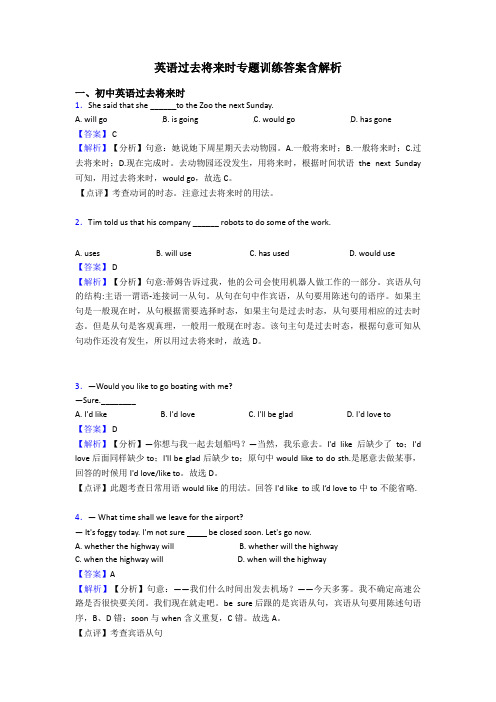
英语过去将来时专题训练答案含解析一、初中英语过去将来时1.She said that she ______to the Zoo the next Sunday.A. will goB. is goingC. would goD. has gone【答案】 C【解析】【分析】句意:她说她下周星期天去动物园。
A.一般将来时;B.一般将来时;C.过去将来时;D.现在完成时。
去动物园还没发生,用将来时,根据时间状语the next Sunday 可知,用过去将来时,would go,故选C。
【点评】考查动词的时态。
注意过去将来时的用法。
2.Tim told us that his company ______ robots to do some of the work.A. usesB. will useC. has usedD. would use【答案】 D【解析】【分析】句意:蒂姆告诉过我,他的公司会使用机器人做工作的一部分。
宾语从句的结构:主语一谓语-连接词一从句。
从句在句中作宾语,从句要用陈述句的语序。
如果主句是一般现在时,从句根据需要选择时态,如果主句是过去时态,从句要用相应的过去时态。
但是从句是客观真理,一般用一般现在时态。
该句主句是过去时态,根据句意可知从句动作还没有发生,所以用过去将来时,故选D。
3.—Would you like to go boating with me?—Sure.________A. I'd likeB. I'd loveC. I'll be gladD. I'd love to【答案】 D【解析】【分析】—你想与我一起去划船吗?—当然,我乐意去。
I'd like后缺少了to;I'd love后面同样缺少to;I'll be glad 后缺少to;原句中would like to do sth.是愿意去做某事,回答的时候用I'd love/like to。
英语过去将来时专项习题及答案解析含解析
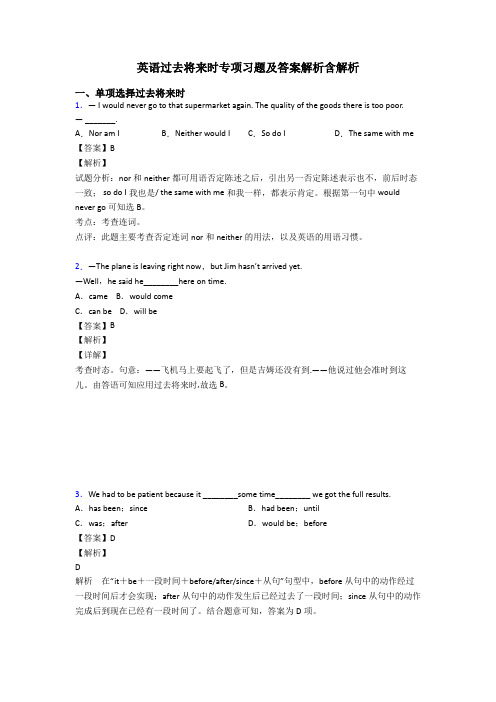
英语过去将来时专项习题及答案解析含解析一、单项选择过去将来时1.— I would never go to that supermarket again. The quality of the goods there is too poor.— _______.A.Nor am I B.Neither would I C.So do I D.The same with me 【答案】B【解析】试题分析:nor 和neither都可用语否定陈述之后,引出另一否定陈述表示也不,前后时态一致; so do I我也是/ the same with me和我一样,都表示肯定。
根据第一句中would never go可知选B。
考点:考查连词。
点评:此题主要考查否定连词nor和neither的用法,以及英语的用语习惯。
2.—The plane is leaving right now,but Jim hasn’t arrived yet.—Well,he said he________here on time.A.came B.would comeC.can be D.will be【答案】B【解析】【详解】考查时态。
句意:——飞机马上要起飞了,但是吉姆还没有到.——他说过他会准时到这儿。
由答语可知应用过去将来时,故选B。
3.We had to be patient because it ________some time________ we got the full results. A.has been;since B.had been;untilC.was;after D.would be;before【答案】D【解析】D解析在“it+be+一段时间+before/after/since+从句”句型中,before从句中的动作经过一段时间后才会实现;after从句中的动作发生后已经过去了一段时间;since从句中的动作完成后到现在已经有一段时间了。
复习专题过去将来时
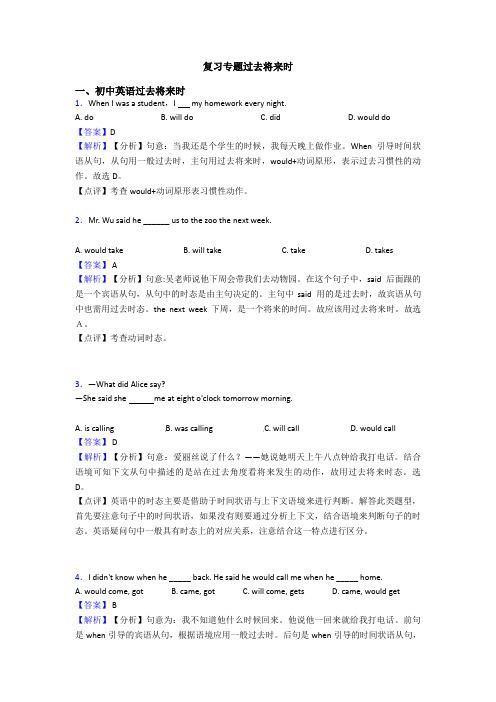
复习专题过去将来时一、初中英语过去将来时1.When I was a student,I my homework every night.A. doB. will doC. didD. would do【答案】D【解析】【分析】句意:当我还是个学生的时候,我每天晚上做作业。
When引导时间状语从句,从句用一般过去时,主句用过去将来时,would+动词原形,表示过去习惯性的动作。
故选D。
【点评】考查would+动词原形表习惯性动作。
2.Mr. Wu said he ______ us to the zoo the next week.A. would takeB. will takeC. takeD. takes【答案】 A【解析】【分析】句意:吴老师说他下周会带我们去动物园。
在这个句子中,said 后面跟的是一个宾语从句,从句中的时态是由主句决定的。
主句中said 用的是过去时,故宾语从句中也需用过去时态。
the next week 下周,是一个将来的时间。
故应该用过去将来时。
故选A。
【点评】考查动词时态。
3.—What did Alice say?—She said she me at eight o'clock tomorrow morning.A. is callingB. was callingC. will callD. would call【答案】 D【解析】【分析】句意:爱丽丝说了什么?——她说她明天上午八点钟给我打电话。
结合语境可知下文从句中描述的是站在过去角度看将来发生的动作,故用过去将来时态。
选D。
【点评】英语中的时态主要是借助于时间状语与上下文语境来进行判断。
解答此类题型,首先要注意句子中的时间状语,如果没有则要通过分析上下文,结合语境来判断句子的时态。
英语疑问句中一般具有时态上的对应关系,注意结合这一特点进行区分。
4.I didn't know when he _____ back. He said he would call me when he _____ home.A. would come, gotB. came, gotC. will come, getsD. came, would get【答案】 B【解析】【分析】句意为:我不知道他什么时候回来。
高考英语过去将来时专项训练

过去将来时单项选择1.Franklin ________ to me in my living room when someone called me to ask me to go out. A.talked B.had been talked C.was talking D.has talked2.Last time I ________ Anna, she ________ a walk with her husband in the park.A.saw, was taking B.had seen, was takingC.had seen, took D.saw, took3.—Sandy, could you repeat the answer to this difficult question?—Sorry, Miss Chen. I ________ something else then.A.am thinking of B.thought of C.had thought of D.was thinking of 4.The girl was reading a story in a low voice.A.宾补B.谓语C.间接宾语D.表语5.Unfortunately, when I dropped in, Professor Smith________, so we only had time for a few words.A.has just left B.had just left C.just left D.was just leaving 6.____ the Terracotta Army _____ some exchange students.A.Visit, were B.Visiting, wereC.To visit, was D.To be visited, were7.My parents dumplings when I got home yesterday afternoon.A.have been making B.are making C.will be making D.were making8.I advised that he ________ to the hospital at once, but he insisted that he ________ quite well then.A.was sent; felt B.be sent; was feelingC.be sent; feel D.should be sent; should feel9.I advised you to find out when the plane _______ at the booking office.A.was taking off B.is taking off C.takes off D.has taken off 10.Here is my note book! I ________ anxious till now and ________ for it a whole day yesterday. A.am; have been looking B.have been; was lookingC.am; had looked D.have been; had looked11.Unluckily, when I dropped in, Dr. Avery _________, so we only chatted for a few minutes.A.just left B.was just leaving C.has just left D.had just left 12.—What’s the problem, Sir?—You________ at least at a speed of about 100 miles per hour.A.are driving B.had driven C.were driving D.have been driving 13.Dick ________ his previous job and ________ as a volunteer on the mountain bend when the journalist interviewed him.A.quits; was working B.had quit; was workingC.would quit; worked D.quit; had worked14.James has just arrived, but I didn’t know he ______ until yesterday.A.will come B.was coming C.came D.had been coming 15.—Have you met Mr. Li?—Yes, When I arrived, he __________ for Shanghai to attend a national conference.A.just left B.had just leftC.just leaves D.was just leaving16.—Did you sleep well last night?—Far from that! One of my neighbors _____music pretty loud.A.plays B.is playingC.was playing D.would play17.She ________ an English magazine when I came in.A.reads B.had read C.will read D.was reading 18.—Why? Tony, you are wearing slippers to school today!— Oops! Sorry, but I ________ that because I ________ about things.A.don't notice; am thinking B.didn't notice; was thinkingC.haven't noticed; have been thinking D.wasn't noticing; have been thinking 19.Here is my note book! I________ anxious till now and ________for it a whole day yesterday. A.am; have been looking B.have been; was lookingC.am; had looked D.have been; had been looking20.—Has your cousin finished writing his report yet?—I have no idea, but he ________it this morningA.wrote B.has written C.had written D.was writing21.—I didn't see Mike at the party yesterday.—He ______ a driving test at that time.A.is taking B.was taking C.took D.has taken 22.Mum ________ Dad’s phone to take photos of the colourful little houses along the coast ________we saw something amazing—a killer whale!A.was using, when B.being used, whichC.was used, when D.is using, that23.I didn’t get in touch with David yesterday, since he ________ a meeting when I called. A.chaired B.was chairing C.had chaired D.would chair 24.—Did you catch what I said?—Sorry. I ________ a text message just now.A.had answered B.have answered C.would answer D.was answering 25.When I arrived, Maria ________, so we only had time for a few words.A.had just left B.has just left C.just left D.was just leaving 26.— Dad, you should have taken me to the football match this morning.— I had intended to, but I ________ a report and couldn’t spare any time.A.had written B.wrote C.was writing D.would write 27.— Hello, everyone! Have you heard the meeting will be put off till next Tuesday?— That’s what we ______ about when you came in.A.are talking B.were talking C.talk D.talked28.- Jenny, could you repeat the answer to this difficult question?-Sorry, Miss Zhang. I ________ something else then.A.am thinking of B.thought of C.had thought D.was thinking of 29.My brother said, “I’m watching TV now.”My brother said ________ ________ watching TV ________.A.he; was; /B.I; was; then C.I; am; that day D.he; was; then 30.-Did you notice the boy come in?-No, I didn’t because I ______ a film.A.had watched B.have watched C.was watching D.am watching 31.—Did you hear the noise downstairs this afternoon? What was that?—Yes. I forgot to tell you. A new machine________then.A.has tested B.had testedC.was tested D.was being tested32.–What happened? I called you several times yesterday evening, but I couldn’t get through. --Sorry, my sister and I ________ on the phone all the time.A.had talked B.have talked C.were talking D.have been talking 33.Susan decided not to work on the program at home because she didn’t want her parents to know what she ________.A.has done B.had done C.was doing D.is doing34.My son________his homework when I left home, I wonder if he________it by now. A.wrote; finished B.was writing; finishedC.was writing; has finished D.is writing; finished35.Unluckily, when I dropped in, Dr. Smith ________, so we only had time for a few words. A.just left B.was just leaving C.has just left D.had just left36.I ________ some newspaper at seven yesterday evening.A.am reading B.read C.was reading D.will read 37.When I arrived at the company, the manager ________, so we had only time for a few words. A.just went away B.had gone awayC.was just going away D.has just gone away38.He________ lunch when I called.A.is having B.was having C.has D.would have39.I________ at the photos on the notice board when I heard a voice behind me.A.was looking B.looked C.have looked D.would look 40.The boy with two dogs ________ in the yard when the earthquake rocked the city.A.is playing B.was playing C.are playing D.were playing 41.He said he________ to draw a plane on the blackboard at that time.A.tries B.tried C.was trying D.will try 42.—How did the accident happen?—You know , it ________ difficult to see the road clearly because it ________.A.was;was raining B.is;has rainedC.is;is raining D.will be;will rain43.He ________ his father on the farm the whole afternoon last Saturday.A.helps B.would help C.was helping D.has helped 44.I ______ along the river when I heard a boy crying for help.A.drove B.was driving C.had driven D.was driven 45.— Is there anything wrong, Tony? You look sad.— Oh, nothing much. In fact, I ________ of my friends.A.have just thought B.was just thinkingC.would just think D.will just be thinking46.--- Just a minute. I’ve got a special gift for you.--- Good. I ________ when I was going to be treated well.A.wonder B.was wondering C.wondered D.have wondered 47.I _______ the charity show on TV when the telephone rang.A.was watching B.watched C.am watching D.watch 48.They ________classes when the earthquake happened.A.had B.would have C.were having D.are having 49.When I got there, he________them to dance.A.is teaching B.teaches C.was teaching D.taught50.―What did the physics teacher ask us to do with the materials?―Sorry, I didn’t hear her clearly. I ________ with a friend on the phone.A.chatted B.was chatting C.will chat D.am chatting 51.—I beg your pardon, but I didn’t quite catch you.—Oh, I ______ myself.A.am talking to B.talked about C.have talked to D.was talking to 52.Jim ______ his bike when he had his finger hurt.A.is repairing B.repaired C.was repairing D.repairs 53.When I said some students were so lazy, I _______ to you.A.don’t refer B.wasn’t referring C.didn’t refer D.hasn’t referred 54.When the boss complained about the slow progress of the project, she ________ to you personally, but to the Department as a whole.A.hasn’t referred B.wasn’t referring C.hadn’t referred D.wouldn’t refer 55.—Do you remember the first time we met?—Yes. It happened at the airport and we for Shanghai.A.waited B.were waiting C.would wait D.had been waiting 56.Unfortunately, when I dropped in, Professor Johnson __________, so we only had time for a few words.A.has just left B.had just left C.just left D.was just leaving 57.Shirley ________ a book about China last year but I don’t know whether she has finished. A.has written B.wrote C.had written D.was writing 58.--Catherine, everyone was at the two-hour concert except you.--Sorry, but I _______ my mother, cleaning up the whole apartment.A.helped B.was helping C.had helped D.am helping 59.—You are late for the morning assembly again!—I’m terribly sorry. I _______a contract almost the whole night.A.was drafting B.have been drafting C.have drafted D.had drafted 60.— I called you at seven yesterday evening, but there was no answer.— Oh, I am sorry. I _____dinner at my friend’s home.A.had had B.had C.was having D.would have参考答案:1.C【详解】考查时态。
【英语】英语过去将来时练习题20篇含解析
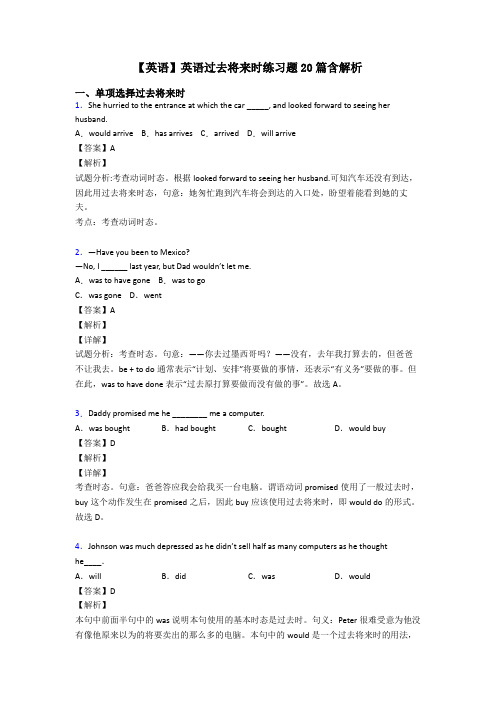
【英语】英语过去将来时练习题20篇含解析一、单项选择过去将来时1.She hurried to the entrance at which the car _____, and looked forward to seeing her husband.A.would arrive B.has arrives C.arrived D.will arrive【答案】A【解析】试题分析:考查动词时态。
根据looked forward to seeing her husband.可知汽车还没有到达,因此用过去将来时态,句意:她匆忙跑到汽车将会到达的入口处,盼望着能看到她的丈夫。
考点:考查动词时态。
2.—Have you been to Mexico?—No, I ______ last year, but Dad wouldn’t let me.A.was to have gone B.was to goC.was gone D.went【答案】A【解析】【详解】试题分析:考查时态。
句意:——你去过墨西哥吗?——没有,去年我打算去的,但爸爸不让我去。
be + to do通常表示“计划、安排”将要做的事情,还表示“有义务”要做的事。
但在此,was to have done表示“过去原打算要做而没有做的事”。
故选A。
3.Daddy promised me he ________ me a computer.A.was bought B.had bought C.bought D.would buy【答案】D【解析】【详解】考查时态。
句意:爸爸答应我会给我买一台电脑。
谓语动词promised使用了一般过去时,buy这个动作发生在promised之后,因此buy应该使用过去将来时,即 would do的形式。
故选D。
4.Johnson was much depressed as he didn’t sell half as many computers as he thoughthe____.A.will B.did C.was D.would【答案】D【解析】本句中前面半句中的was说明本句使用的基本时态是过去时。
【初中英语】过去将来时专项练习
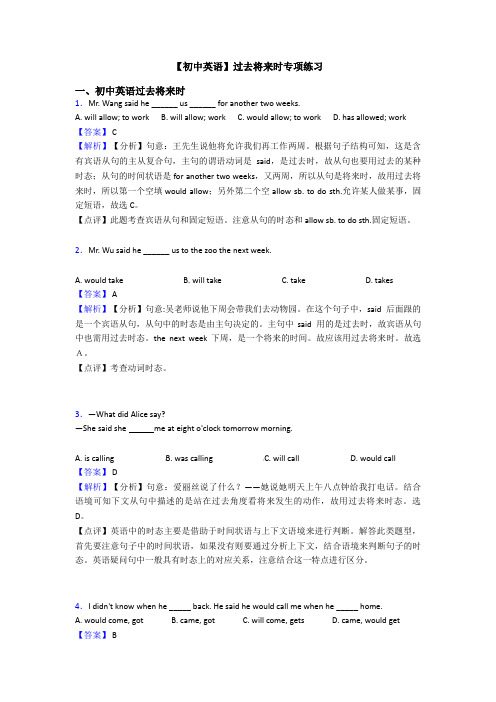
【初中英语】过去将来时专项练习一、初中英语过去将来时1.Mr. Wang said he ______ us ______ for another two weeks.A. will allow; to workB. will allow; workC. would allow; to workD. has allowed; work 【答案】 C【解析】【分析】句意:王先生说他将允许我们再工作两周。
根据句子结构可知,这是含有宾语从句的主从复合句,主句的谓语动词是said,是过去时,故从句也要用过去的某种时态;从句的时间状语是for another two weeks,又两周,所以从句是将来时,故用过去将来时,所以第一个空填would allow;另外第二个空allow sb. to do sth.允许某人做某事,固定短语,故选C。
【点评】此题考查宾语从句和固定短语。
注意从句的时态和allow sb. to do sth.固定短语。
2.Mr. Wu said he ______ us to the zoo the next week.A. would takeB. will takeC. takeD. takes【答案】 A【解析】【分析】句意:吴老师说他下周会带我们去动物园。
在这个句子中,said 后面跟的是一个宾语从句,从句中的时态是由主句决定的。
主句中said 用的是过去时,故宾语从句中也需用过去时态。
the next week 下周,是一个将来的时间。
故应该用过去将来时。
故选A。
【点评】考查动词时态。
3.—What did Alice say?—She said she me at eight o'clock tomorrow morning.A. is callingB. was callingC. will callD. would call【答案】 D【解析】【分析】句意:爱丽丝说了什么?——她说她明天上午八点钟给我打电话。
【英语】过去将来时练习全集及解析
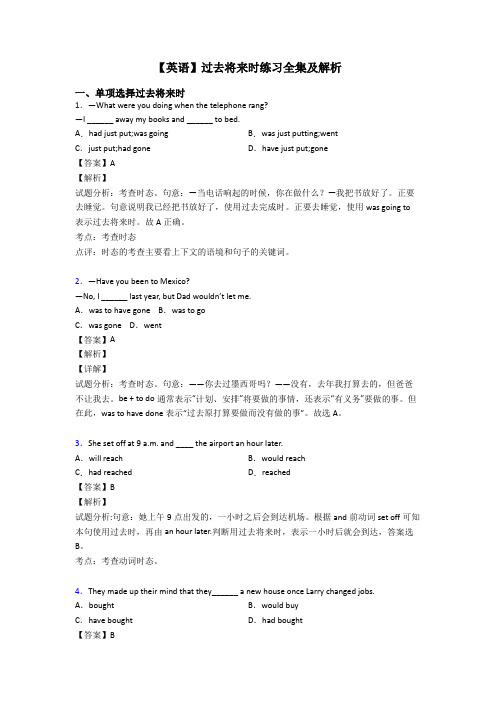
【英语】过去将来时练习全集及解析一、单项选择过去将来时1.—What were you doing when the telephone rang?—I ______ away my books and ______ to bed.A.had just put;was going B.was just putting;wentC.just put;had gone D.have just put;gone【答案】A【解析】试题分析:考查时态。
句意:—当电话响起的时候,你在做什么?—我把书放好了。
正要去睡觉。
句意说明我已经把书放好了,使用过去完成时。
正要去睡觉,使用was going to 表示过去将来时。
故A正确。
考点:考查时态点评:时态的考查主要看上下文的语境和句子的关键词。
2.—Have you been to Mexico?—No, I ______ last year, but Dad wouldn’t let me.A.was to have gone B.was to goC.was gone D.went【答案】A【解析】【详解】试题分析:考查时态。
句意:——你去过墨西哥吗?——没有,去年我打算去的,但爸爸不让我去。
be + to do通常表示“计划、安排”将要做的事情,还表示“有义务”要做的事。
但在此,was to have done表示“过去原打算要做而没有做的事”。
故选A。
3.She set off at 9 a.m. and ____ the airport an hour later.A.will reach B.would reachC.had reached D.reached【答案】B【解析】试题分析:句意:她上午9点出发的,一小时之后会到达机场。
根据and前动词set off可知本句使用过去时,再由an hour later.判断用过去将来时,表示一小时后就会到达,答案选B。
(英语)英语过去将来时专项及解析

A. opened B. was opening C. was to open D. had opened
解析:D。句意:她说在商业大街上有新开了一家书店。
14.-- Come on. I have a gift for you.
A.tookB.had takenC.were takingD.would take
【答案】D
【解析】
【详解】
考查时态。句意:约约翰得到了他父亲和祖父带去上学的同一个手提箱。would表示过去常常的意思,相当于used to。根据句意,此处表示“他父亲和祖父过去常常随身带着的”。故选B。
12.The local government announced that only when the fire was under control ________ to return to their homes.
考点:考查代词及动词时态的用法。
点评:本题难度适中。代词是高中阶段要求掌握的语法项目,尤其是it的用法多,并且还是高考常考的知识点,需要考生在平时反复的练习中巩固掌握它的用法。动词的时态是高考必考的内容,考生必须会理解不同时态的用法。
即学即练:At the shop, they wanted to show me all the dresses, but I was interested only in ________ in the window.
— I ____, but I remembered I had a lot of homework to do.
A.hadB.wouldC.was going toD.did
(英语)高一英语过去将来时专项训练100(附答案)含解析
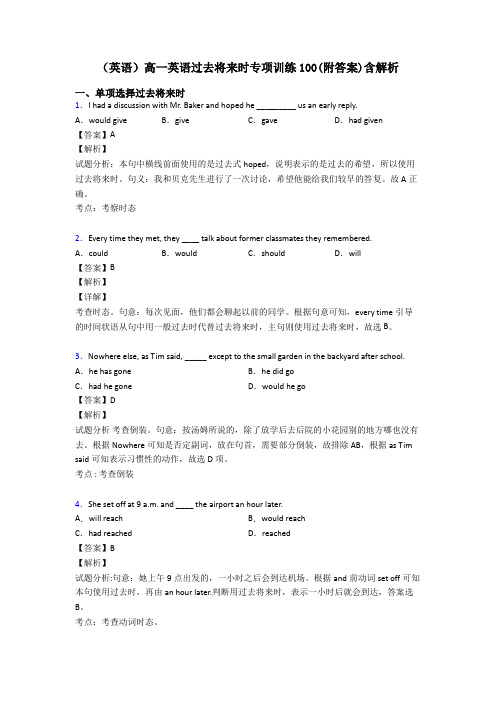
(英语)高一英语过去将来时专项训练100(附答案)含解析一、单项选择过去将来时1.I had a discussion with Mr. Baker and hoped he _________ us an early reply.A.would give B.give C.gave D.had given【答案】A【解析】试题分析:本句中横线前面使用的是过去式hoped,说明表示的是过去的希望,所以使用过去将来时。
句义:我和贝克先生进行了一次讨论,希望他能给我们较早的答复。
故A正确。
考点:考察时态2.Every time they met, they ____ talk about former classmates they remembered.A.could B.would C.should D.will【答案】B【解析】【详解】考查时态。
句意:每次见面,他们都会聊起以前的同学。
根据句意可知,every time引导的时间状语从句中用一般过去时代替过去将来时,主句则使用过去将来时,故选B。
3.Nowhere else, as Tim said, _____ except to the small garden in the backyard after school. A.he has gone B.he did goC.had he gone D.would he go【答案】D【解析】试题分析考查倒装。
句意:按汤姆所说的,除了放学后去后院的小花园别的地方哪也没有去。
根据Nowhere可知是否定副词,放在句首,需要部分倒装,故排除AB,根据as Tim said可知表示习惯性的动作,故选D项。
考点 : 考查倒装4.She set off at 9 a.m. and ____ the airport an hour later.A.will reach B.would reachC.had reached D.reached【答案】B【解析】试题分析:句意:她上午9点出发的,一小时之后会到达机场。
- 1、下载文档前请自行甄别文档内容的完整性,平台不提供额外的编辑、内容补充、找答案等附加服务。
- 2、"仅部分预览"的文档,不可在线预览部分如存在完整性等问题,可反馈申请退款(可完整预览的文档不适用该条件!)。
- 3、如文档侵犯您的权益,请联系客服反馈,我们会尽快为您处理(人工客服工作时间:9:00-18:30)。
英语过去将来时专项一、单项选择过去将来时1.She hurried to the entrance at which the car _____, and looked forward to seeing her husband.A.would arrive B.has arrives C.arrived D.will arrive【答案】A【解析】试题分析:考查动词时态。
根据looked forward to seeing her husband.可知汽车还没有到达,因此用过去将来时态,句意:她匆忙跑到汽车将会到达的入口处,盼望着能看到她的丈夫。
考点:考查动词时态。
2.—Have you been to Mexico?—No, I ______ last year, but Dad wouldn’t let me.A.was to have gone B.was to goC.was gone D.went【答案】A【解析】【详解】试题分析:考查时态。
句意:——你去过墨西哥吗?——没有,去年我打算去的,但爸爸不让我去。
be + to do通常表示“计划、安排”将要做的事情,还表示“有义务”要做的事。
但在此,was to have done表示“过去原打算要做而没有做的事”。
故选A。
3.She set off at 9 a.m. and ____ the airport an hour later.A.will reach B.would reachC.had reached D.reached【答案】B【解析】试题分析:句意:她上午9点出发的,一小时之后会到达机场。
根据and前动词set off可知本句使用过去时,再由an hour later.判断用过去将来时,表示一小时后就会到达,答案选B。
考点:考查动词时态。
4.They made up their mind that they______ a new house once Larry changed jobs. A.bought B.would buyC.have bought D.had bought【答案】B【解析】试题分析:once引导的是条件状语从句,根据主句将来时从句一般现在时的用法可知,从句一般过去时,主句应是一般将来时的过去时。
句意为:他们打算只要Larry换了工作他们就买新房子。
故答案选B。
考点:考查时态和语态。
【名师点睛】考查过去将来时。
一、"would+动词原形"表示过去将来时"would+动词原形"构成过去将来时,常表示根据计划或安排即将发生的事。
例1:He said he would come to see me.他说他要来看我。
例2:He told me he would go to Beijing.他告诉我他将去北京。
二、"was /were+going to+动词原形"表示过去将来时"was /were+going to+动词原形"也可表示根据计划或安排即将发生的事。
例1:She said she was going to start at once.她说她将立即出发。
例2:I was told that he was going to return home.他告诉我他准备要回家,本句中关键词为made up这一过去时态,这是在过去计划将来做某事。
因此,用过去将来时。
5.— Bob, did you go to the film at the weekend?— I ____, but I remembered I had a lot of homework to do.A.had B.would C.was going to D.did【答案】C【解析】试题分析:句意:--鲍勃,你在周末去看电影了吗?--我本打算去,但是我记得我有很多作业要做。
这里表示过去本打算做而没有做,用was/were going to do是一种虚拟语气。
所以选C。
考点:考查虚拟语气6.When Harry was at college, he ________ go to the reading room after supper every day. A.should B.mightC.would D.could【答案】C【解析】C 考察情态动词。
句义:Harry上大学的时候,每天晚饭后都要去阅览室。
Would表示过去常常,愿意。
根据句义可知本句表示的是过去习惯性的动作。
故C正确。
7.—Isn’t it amazing that I met Francis at the Christmas party?—Really?For how many years ____ each other?A.didn’t you s ee B.haven’t you seenC.hadn’t you seen D.don’t you see【答案】C【解析】考查动词的时态。
根据题干中第一句话的过去时态met可知,后面一句话问的是在碰到他之前有多久没看到他了,因此要用过去完成时。
8.----Why didn’t you apply for the job?----I ________, but my old friend offered me a better one.A.was going to B.would C.will D.am going to【答案】A【解析】试题分析:考查情景交际和时态。
句意:--你为什么没有申请那份工作?--我本打算(申请),但是我的老朋友给我提供了一个更好的。
am/is/are going to表示按照计划、打算、安排要发生的事情,will只是表示纯粹的将来,表示临时的决定。
was/were going to可表示原本打算做某事,其实没有实现。
故选A。
考点:考查情景交际和时态9.My father told me that he ________ me some gifts when he returned from America the next week.A.will buy B.buy C.would buy D.buy【答案】C【解析】试题分析:考查动词的时态。
句意:我的父亲告诉我,下周他会从美国返回,会给我带礼物。
根据时间状语 the next week可知用将来时,再根据told可知用过去将来时,故选C 项。
考点 : 考查动词的时态10.I had a discussion with Mr. Baker and hoped he _________ us an early reply.A.would give B.give C.gave D.had given【答案】A【解析】试题分析:本句中横线前面使用的是过去式hoped,说明表示的是过去的希望,所以使用过去将来时。
句义:我和贝克先生进行了一次讨论,希望他能给我们较早的答复。
故A正确。
考点:考察时态11. - Jerry, sorry to have kept you wait.- It doesn’t matter, but I________ you ________ later than me.A.didn’t think, would be B.am thinking, will beC.thought, had been D.never thought, would be【答案】D【解析】试题分析:句意:Jerry,对不起让你久等了。
—没关系,但我没有想过你会比我还要晚。
根据上下文可知我在之前没有想到你会比我晚,所以第一空使用一般过去时。
第二空使用过去将来时表示过去想未来的事情。
故D正确。
考点:考查时态12.We made ____ clear when and where we ____ going to have the meeting.A.that; are B.it; are C.it; were D.that; were【答案】C【解析】试题分析:句意:我们弄清楚了什么时间和什么地点召开会议。
这里it是形式宾语,真正的宾语是后面的从句;第二空谓语动词的时态根据主句的动词来确定,主句用了过去式,宾语从句也用过去式,故选C。
考点:考查代词及动词时态的用法。
点评:本题难度适中。
代词是高中阶段要求掌握的语法项目,尤其是it的用法多,并且还是高考常考的知识点,需要考生在平时反复的练习中巩固掌握它的用法。
动词的时态是高考必考的内容,考生必须会理解不同时态的用法。
即学即练:At the shop, they wanted to show me all the dresses, but I was interested only in________ in the window.A. thisB. thatC. itD. the one解析:D。
the one替代the dress.13.The local government announced that only when the fire was under control ________ to return to their homes.A.the residents would be allowed B.had the residents been allowedC.would the residents be allowed D.the residents had been allowed【答案】C【解析】试题分析:考查Only引导的部分倒装句。
Only引导的倒装句要满足两个条件,only放在句首,且强调的是状语。
本题only放在了后面句子的句首,强调是是时间状语从句when the fire was under control。
故使用部分倒装的形式。
句意:当地政府宣布,只有当大火被控制住以后,据居民们才可以返回家中。
故C正确。
考点:考查部分倒装句点评:部分倒装中考查较多的有:(1) 含有否定意义的词never,seldom,little. hardly,not,scarcely,nowhere,by no means(决不)等置于句首时。
(2)以only修饰作为状语的副词、介词短语或从句,且放在句首时。
注意:only 修饰状语从句放在句首时,状语从句不需要倒装,只能倒装主句部分。
(3)当so置于句首意为“也如此”,neither,nor置于句首意为“也不”时。
当so表示对前句内容的肯定和附和,译作“确实,正是”时,用自然语序。
(4)当not only…but also, so/such…that, not… until, no sooner… than, hardly… when等连词置于句首时。
